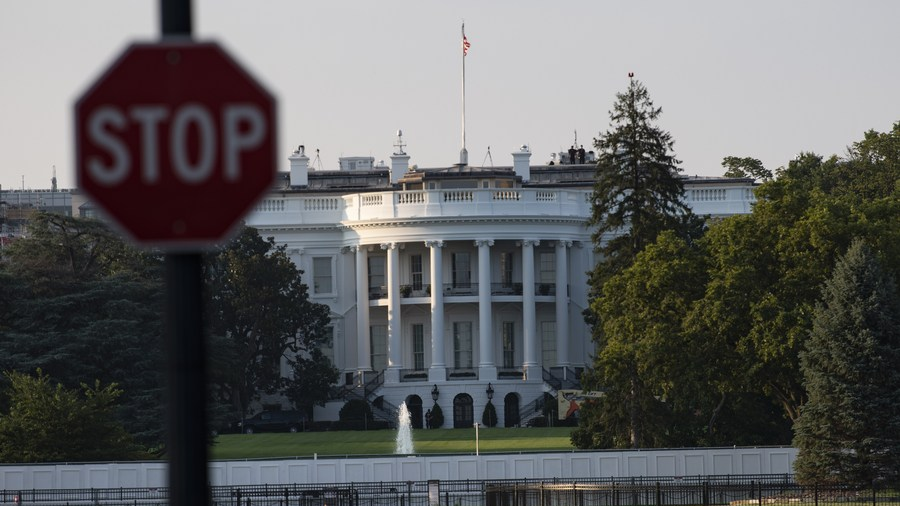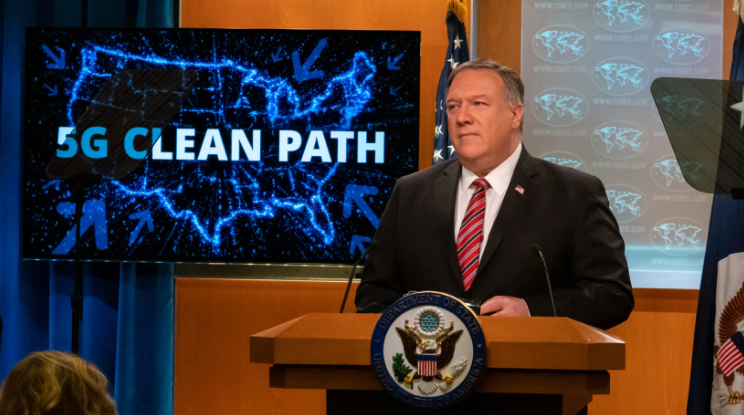
The White House in Washington, D.C., the U.S., August 10, 2020. /Xinhua
The White House in Washington, D.C., the U.S., August 10, 2020. /Xinhua
Editor's note: Tom Fowdy is a British political and international relations analyst and a graduate of Durham and Oxford universities. He writes on topics pertaining to China, the DPRK, Britain and the U.S. The article reflects the author's opinions, and not necessarily the views of CGTN.
"Clean Network," "clean applications," "clean cloud"– boasted Mike Pompeo several months ago as he broke off his leash to pursue a fanatical crusade against China and in effect become the de-jure operator of the White House's entire policy on Beijing. Despite being America's top diplomat, or in essence a representative, the state department churned out these proposals as if they were an electoral manifesto of some sorts. They were highly ambitious, the Secretary of State was effectively calling for the outright ban of Chinese applications in the United States, cloud programs, telecommunications firms and also to ban U.S. companies from hosting their applications on Chinese providers.
Pompeo's vision represented a grim picture of a rapidly escalating technology war and a hell bent pursuit of decoupling on the pursuit of Washington hawks. With the White House having churned out anti-China measures bi-weekly across a space of three months, it seemed almost inevitable he would get his way. Yet, several months on, despite Pompeo continuing to espouse the "clean" rhetoric, his proposals haven't come to fruition in the way he hoped. In fact, they've hit a number of roadblocks which have exposed the obvious lack of realism and incentives behind them. For all Washington's actions have been extreme, the prospect of purging China from the technological sphere just isn't realistic.
This week it was announced that new Japanese Prime Minister Yoshihide Suga told the United States his country would not be participating in the "Clean Network" initiative and would not be banning Chinese telecommunication firms from its networks. This comes despite Washington playing growing emphasis on the "Quad" as a proposed anti-China alliance in the Pacific; Tokyo's previous bans on Huawei and generally frosty relations with Beijing. The snub was not widely publicized, but it nevertheless shined a light on the fanatical rhetoric Pompeo was espousing several weeks earlier when he visited Japan for the grouping of the four nations. Even Tokyo does not see value in the absolute purge of China from their telecommunications industry.

U.S. Secretary of State Mike Pompeo speaks during a news conference at the State Department, Washington, D.C., U.S., April 29, 2020. /AP
U.S. Secretary of State Mike Pompeo speaks during a news conference at the State Department, Washington, D.C., U.S., April 29, 2020. /AP
The following week, Seoul also gave Pompeo a similar answer. Despite America's aggression against Huawei, the firm continues to participate in South Korea's 5G networks with the firm LG Plus, and when asked by the U.S. to join the "Clean Network," the Blue House has avoided an immediate response, instead emphasizing that it does not want to intervene with a "private sector area." Although the White House has pushed European countries hard under duress, to exclude Huawei, ultimately enthusiasm to stretch as far as what Pompeo defines as a "Clean Network" remains an aspect of his own imagination and other nations do not share his vision, despite repeated proclamations of his success on Twitter. Results on Huawei have been obtained under duress, not on the merits of their affordability – hence the European telecommunications lobby warned against banning the company just this week.
The White House pursuit against Chinese applications has been even less successful, not least at home. Although this extends beyond Pompeo alone, two White House efforts to ban popular Chinese applications have pretty much ended in failure, and then fell of the agenda. Executive order bans against both TikTok and WeChat were struck down by American courts, with a judge commenting on the latter that she was not inclined to reverse her decision, setting an immediate precedent against further actions on other apps. As a deal on TikTok evaporated and the COVID-19 saga exploded at the White House, the sledgehammer efforts at Chinese applications appear to have fallen off the agenda, seemingly shelving Pompeo's vision to ban all Chinese related apps and then American applications in China itself.
To say the least, Pompeo's rhetoric is ultimately pompous. Even for allies, the extremity and aggressive tone of his rhetoric on China is simply not shared by other countries and usually followed by subsequent remarks by those nations who seek to distance themselves from his position. His "clean" vision was not so much a detailed diplomatic strategy as it was an evangelical wish list, a botched attempt at making national policy on his own. The fact that Pompeo also submitted a proposal to have Ant financial banned, a company which has nothing to do with the U.S. State Department portfolio, strongly suggests that with this list of "clean" items, he is vastly overstretching his portfolio. Yet it is obvious in terms of tangible results that not only are his ideas struggling to gain momentum at home, they are likewise abroad too. Pompeo's "clean" pursuit is full of dirty tricks, but thankfully it appears to be hitting a roadblock.
(If you want to contribute and have specific expertise, please contact us at opinions@cgtn.com.)